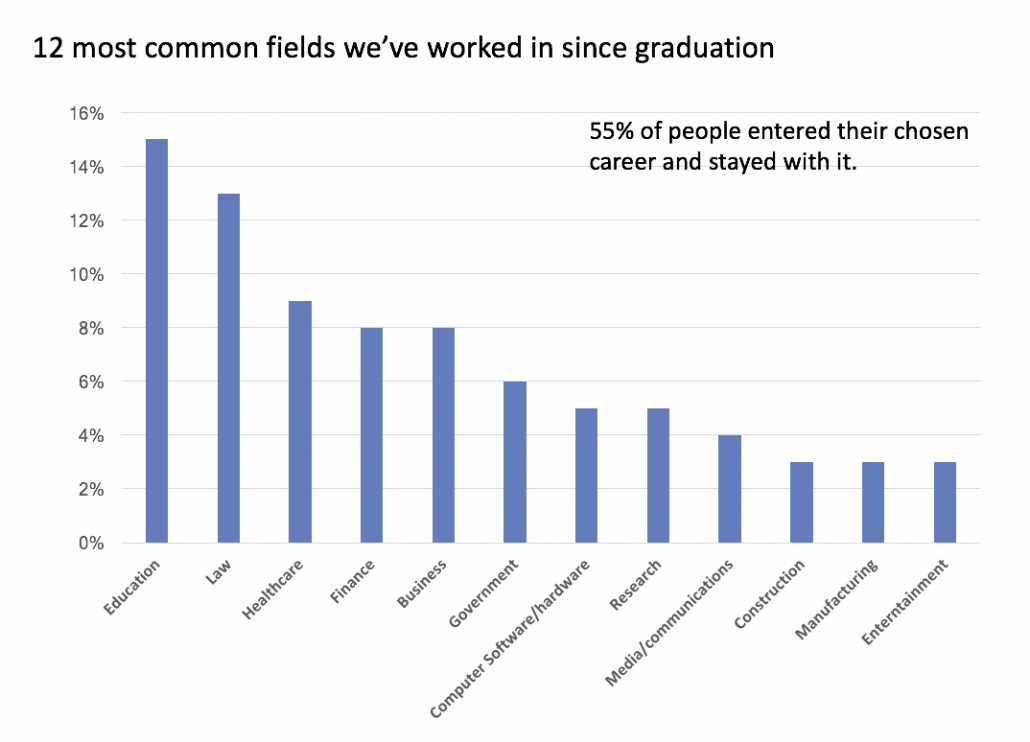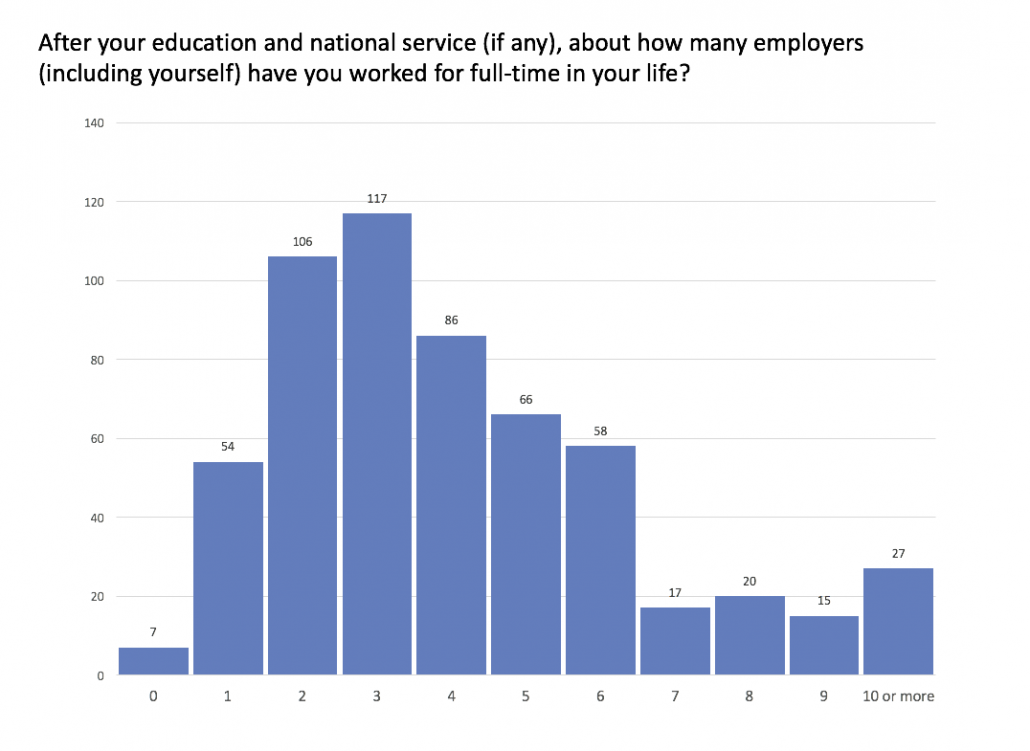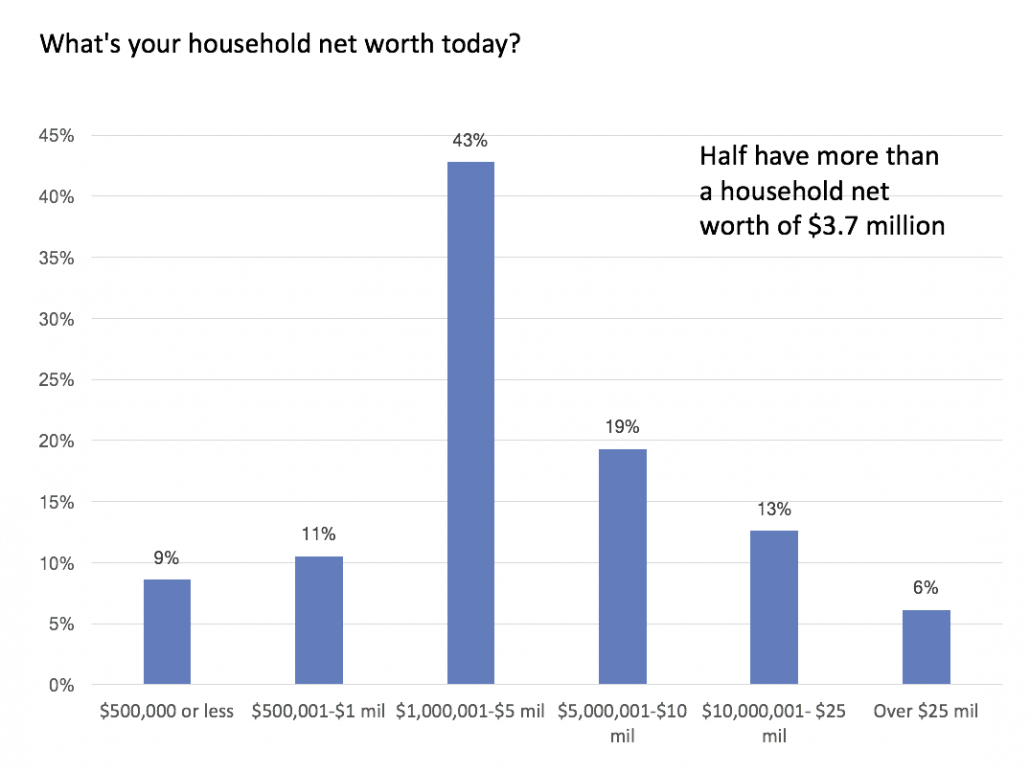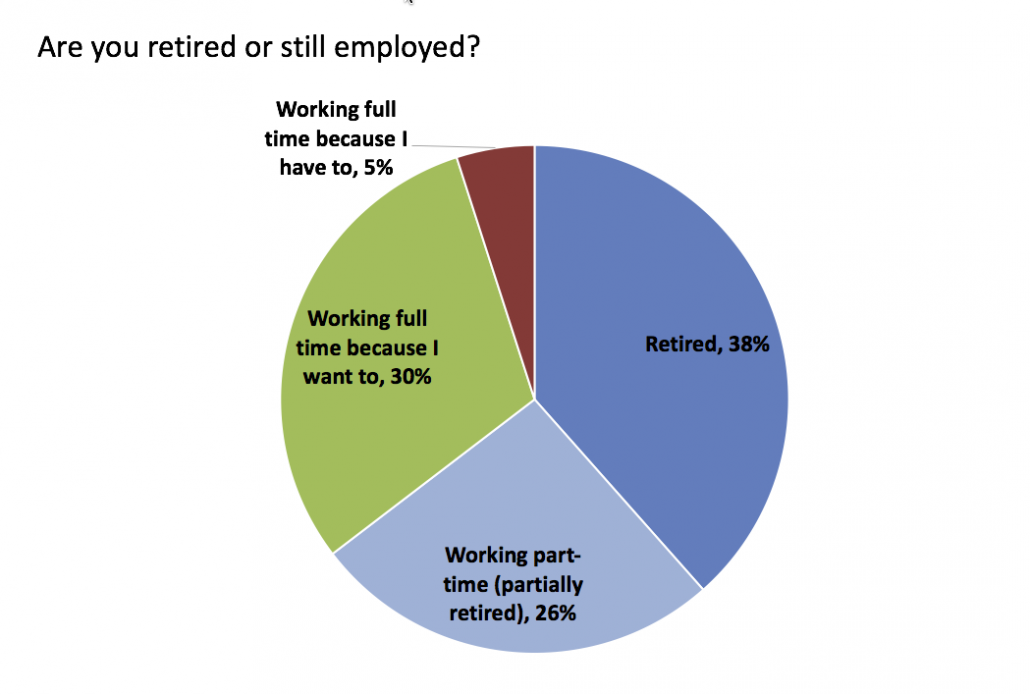Survey: 3. Work, Career, Net Worth
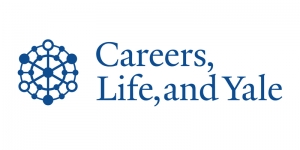 Work, career, volunteering, entrepreneurship — what did the broad sweep of our productive years entail? What are we doing now? How well, financially speaking, did we do? That’s the subject of this installment of these “reports From The Class Survey.”
Work, career, volunteering, entrepreneurship — what did the broad sweep of our productive years entail? What are we doing now? How well, financially speaking, did we do? That’s the subject of this installment of these “reports From The Class Survey.”
When we first graduated, before settling into a serious career, we had to deal with the draft, taking time away, going to graduate school, serving in the Peace Corps (5% of us served in the Peace Corps or similar volunteer commitment), or making some false starts that didn’t quite work out. But mostly we had to deal with the draft:
Military Service
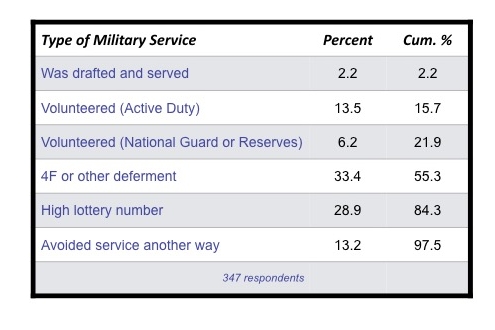
22% of us went into the military full time, at least for the mandatory training period. A surprising number got deferments, some for medical school, some for physical conditions. (See the extensive comments to What Was Your Draft Number?) Although all of us were affected by the draft in some way, only 2% of us actually got that dreaded “Greetings” letter from Uncle Sam.
Graduate School
A good number of us went on to graduate school (even though that route no longer provided an automatic draft deferment), and here are the degrees we have received. Owing to some people having multiple degrees, the total adds up to over 100%. A random sample of 100 of the Personal Essays submitted for the 50th Reunion ClassBook shows that 84% of people who submitted Personal Essays have at least one advanced degree — although that is not a random sample of the class as a whole. (520 classmates submitted Personal Essays for the 50th Reunion ClassBook and the Survey garnered 579 usable responses — all from 924 living Classmates.)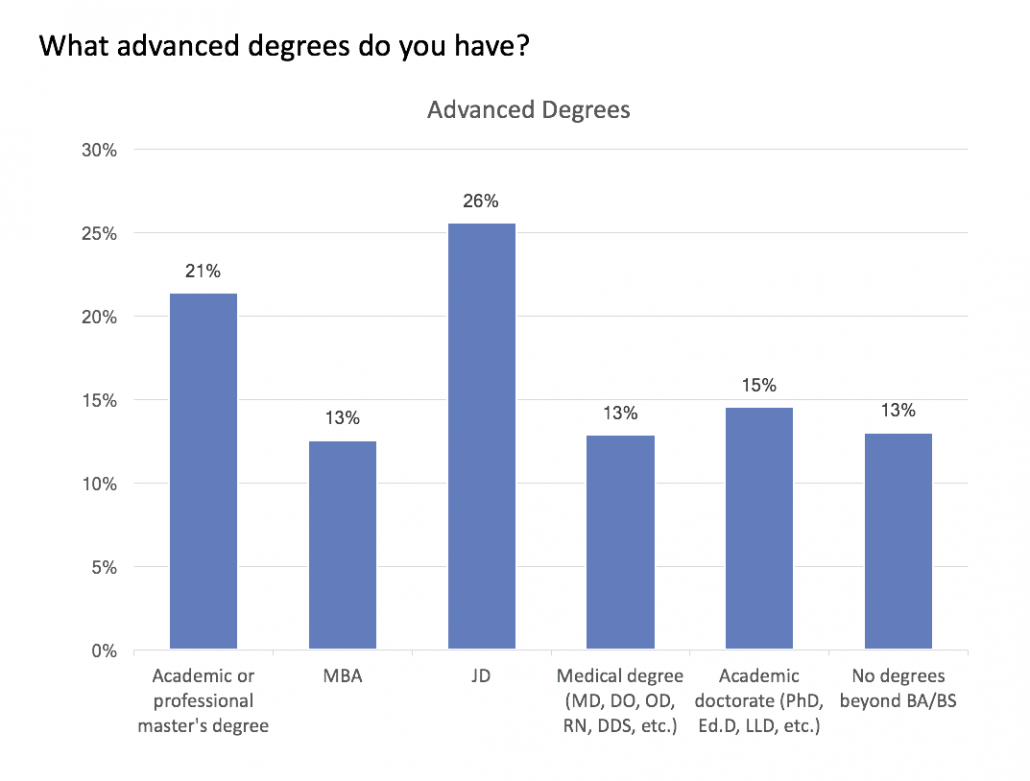
In Which Sectors Of Society Did We Work?
If you think everybody else in our class went on to become a lawyer, a doctor, or an entrepreneur, that’s not a complete picture. The largest field for our classmates was education (15 percent of us), followed by law (13 percent) and healthcare (9 percent). Finance and business occupied eight percent each, and several other fields drew in significant proportions of our classmates.
The questionnaire asked each classmate what his career was like after he completed his education and any obligatory military service. The majority (55 percent), said they entered their chosen career and stayed with it. Seventeen percent reported one major change in occupation, while 10 percent had several career changes. Eight percent chose “I did pretty much the same thing all my life, but in multiple industries or fields.” Only two percent said, “I just went from one thing to another, no real pattern.”
 Our employment patterns were pretty steady for most of us, but not for all. When we asked how many employers our classmates had worked for full-time in their life, we got the results seen in the figure below. While eight percent actually worked for only one employer, the most frequent responses were “two employers (16 percent) or “three employers” (18 percent). Five percent of us had 10 employers or more in their lifetime. Asked if they’ve ever been fired or laid off, nearly two-thirds (63 percent) said “never,” but 20 percent said “once,” 11 percent said “twice,” and six percent said “several times.”
Our employment patterns were pretty steady for most of us, but not for all. When we asked how many employers our classmates had worked for full-time in their life, we got the results seen in the figure below. While eight percent actually worked for only one employer, the most frequent responses were “two employers (16 percent) or “three employers” (18 percent). Five percent of us had 10 employers or more in their lifetime. Asked if they’ve ever been fired or laid off, nearly two-thirds (63 percent) said “never,” but 20 percent said “once,” 11 percent said “twice,” and six percent said “several times.”
Entrepreneurship & Boards: We are an entrepreneurial bunch, to be sure. About 50 percent of us have started a business at some point. About 5 percent have actually taken a company public. Twenty-three percent have sat on boards of for-profit companies. But a much higher 62 percent have sat on boards of non-profit organizations.
Publishing: And we have other accomplishments as well: nearly half of us (49 percent) have published a book or an article in a scholarly journal. Nineteen percent have published regularly in either print or electronic media.
Political Offices: Six percent have run for public office, and eight percent have “won an election,” which must include elections for posts outside of public office.
Net Worth
We all know that money isn’t everything, yet we still thought it important to ask about financial success, measured as self-reported net worth. We certainly haven’t done badly as a class, with the median net worth coming in at $3.7 million dollars. As seen in the Figure below, the largest number of us (43 percent) have net worth in the one-to-five million dollar range. One in five of us has net worth over $10 million dollars, including the six percent worth over $25 million. (As a reminder, the survey was fully anonymous and none of this information was or will be shared with the fund raisers in the development office. As the survey said: “No salesman will call . . . ,”)
How Are We Spending Time Now?
We are still surprisingly engaged and active, sometimes working for the fun of it, sometimes just part-time and sometimes driven by the need to keep some positive cash flow so that savings last longer, and we don’t outlive our money. That said, 38% of us are “retired” at this point.
Work vs. Volunteer Activity. While that question asked about our remunerative “work,” it didn’t cover the time we commit to volunteer activities. I think it fair to say that Yale did encourage a certain civic commitment and expectation that we who have been so fortunate should donate some time (and money!) to worthy causes. Call it civic duty, tithing, giving-back or noblesse oblige, about 60% of us are actively volunteering our time — sometimes significant amounts — to help our fellow [wo]man.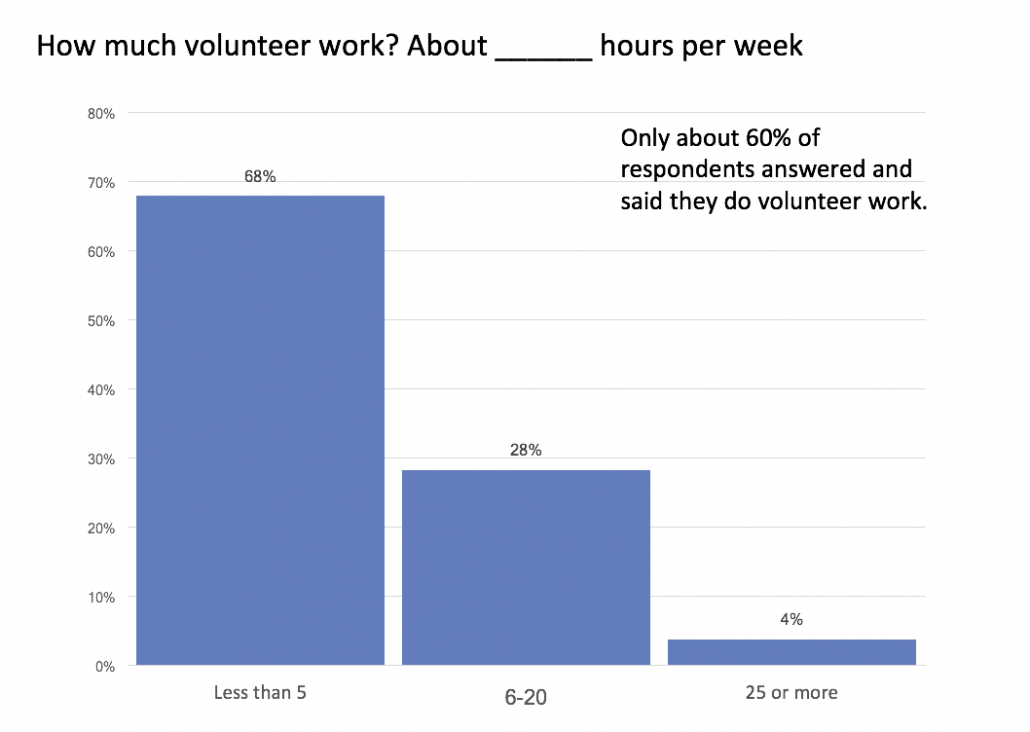
Even though the Class Survey did seem a bit long (it took an average of 24 minutes to fill out), we really didn’t drill into the nature of how we are spending our time now — either for work, volunteering, play or otherwise. One of the themes that the Reunion Committee wants to explore at the reunion itself is the question: “Are we ‘done’ yet?” Can we do more, paid or unpaid, to create value for ourselves or others? Those are definitely Tall Questions … and will be explored here in Yale1969.org, at the Reunion and, hopefully, in all our lives, together and apart.


